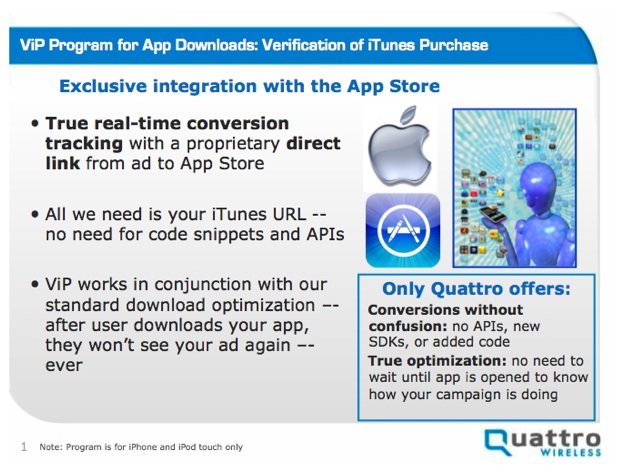
For anyone still wondering whether Apple plans to give its new iAds a competitive advantage over other mobile ad networks on the iPhone and iPad, just take a look at the slide above. It was attached to an email sent to an app developer from a Quattro Wireless sales rep which I obtained (Quattro is Apple’s recently purchased mobile ad network). The email starts off:
We’re excited to announce a brand new program launching this month called ViP (Verification of iTunes Purchase).
The VIP program is aimed at app developers who use iPhone ads to drive downloads and purchases of their own apps. It will tie the ad directly into purchasing data from iTunes, letting app developers measure the conversion rate of ad impressions to downloads. As the slide indicates, this tracking is made possible with a “proprietary direct link from the ad to App Store” and once a “user downloads your app, they won’t ever see your ad again.”
Other mobile ad networks, such as AdMob, also try to measure conversion rates, but they don’t have access to the same iTunes data. So Apple is in a position to give advertisers much more detailed and accurate metrics. AdMob, for instance, requires developers to integrate their apps with AdMob’s SDK or APIs before they can deliver conversion tracking. To bring home the difference, the Quattro sales rep ends the email with this pitch:
No SDK or server-side integration—this cannot be duplicated by any of our competitors.
In other words, if Apple doesn’t shut out other ad networks completely from the iPhone by not allowing app developers to send tracking data to third parties, it might just use its control of the iPhone platform to give its own ad products certain advantages.
Apple’s push to create ad products that “cannot be duplicated by any” competitor is especially interesting, given that the FTC can’t seem to decide right now whether to go after Apple or block the Google-AdMob deal on antitrust grounds. Which one again has an unfair advantage in the mobile ad market? At this point, it’s way too hard to tell.